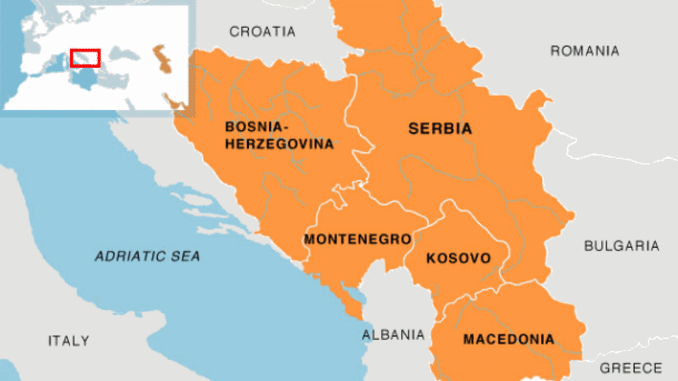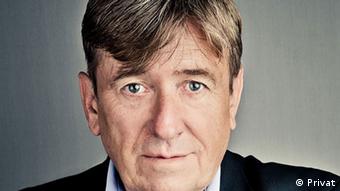
INTERVIEW – The prospect of EU membership has driven democratic progress in the Western Balkans for years. Without it, the consequences for Europe could be alarming, says Norbert Mappes-Niediek.
Deutsche Welle: The tone between the states and among the various ethnic groups in the Western Balkans (Macedonia, Albania, Kosovo, Serbia, Montenegro, Bosnia-Herzegovina, Croatia) has gotten rougher in recent weeks and months. It appears that the region is growing increasingly unstable. Should Europe be concerned again with the Western Balkans?
Norbert Mappes-Niediek: Yes, I think so. The rhetoric serves mainly as a way for leaders to show that they are protecting their electorate. Talking badly about your hated neighbors tends to go over well. It allows you to create a sense that there’s a threat, and at the same time, give people the impression that you’re the right person to protect them from that threat. Such talk in itself is not dangerous, but it can become dangerous if it gains momentum. And that is possible – that is a real danger. The weaker the EU becomes, the less influence it has, the more it feeds this momentum. I don’t see it ending in a reorientation toward Moscow or Ankara, but people will start to take firmer positions.
What role does the EU play in this region, and how much influence does it have?
In the last 20 to 25 years, the EU was the only alternative to sectionalism, where nobody cuts anyone some slack. The ambition to join the EU played a big role, across the region. It started in 1991, when Slovenia gained independence. At the time, Foreign Minister Dimitrij Rupel said that the collapse of Yugoslavia and the unification of Europe were two sides of the same coin. One could not happen without the other. That means, it was because of European unity that Yugoslavia fell apart. Back then, people thought that anyone who wanted to join the EU should jump on the wagon quickly, and not wait until the others were ready. Slovenia didn’t want to be a small, isolated island in the ocean of the world. Rather, it wanted to be part of the European Union.
The same is even truer for the other nations. There’s barely even a concept of how you’re meant to survive as a small national state in such a globalized world if you’re not part of the EU. The people believe in the EU, and in part they want to be in the EU because they don’t trust their own elites. But then, there was a break in 2014 when the new EU commission was elected. The new Commission President Jean-Claude Juncker made it clear that there would be no more EU expansion in the next five years. And the fact that he stated this so openly felt like a door was slammed shut.
What do you mean when you say that the people in the Western Balkans need the EU as a corrective for their political elite?
They want to have some form of back up. People in Macedonia used to tell me that before, in the former Yugoslavia, people would look to Belgrade whenever they had the feeling that their own government was no longer on the right track, or was giving in to interest groups. There had to be a greater power. Their own leadership in Skopje was insufficient. I heard the same sort of thing in Belgrade. As long as there was the prospect of EU membership, people could be relatively assured that their leadership would not become too authoritarian and throw all the opposition leaders in jail.
Is the EU that people talk about in Belgrade, Pristina, or Sarajevo the same as the EU that people in Berlin, Paris, or Brussels talk about?
There are different perspectives depending on which country you’re in. And that’s true even beyond the West and Southeastern Europe. There are certain models that people have in their heads. The British model was one big free trade zone, a kind of commonwealth. In Germany, people tend to picture a federal state, while the Austrians see an imperial monarchy. In the countries that were formerly part of Yugoslavia, people imagine the EU as a type of Yugoslavia. The parallels are often amazing.
Even now, with the EU in crisis, many people are reminded of the Yugoslavian crisis. The Slovenian economist Joze Mencinger put it nicely when he said that the EU is suffering from the Yugoslav Syndrome. That means, there’s a common economy, but different nations, different identities, and even different economic policies. The Slovenians and the Croatians in the former Yugoslavia used to fear that they were paying into a bottomless pit to support Kosovo, Macedonia or Bosnia, just the same way that the Germans in the EU today feel about Greece. On the other hand, the Kosovars, the Macedonians and the Bosnians used to always complain that Slovenia and Croatia were getting richer while they were getting poorer. And the Greeks can say the same thing today about the Germans. These are the kinds of parallels that many people have in their minds when they think of the EU.
Do you see a danger that Russia could become a more important partner for the Balkan states than the EU?
I don’t think that these countries will now start looking toward Russia. Moscow doesn’t really have much to offer, other than energy. And Russia would find it difficult to take on the kind of role in the region that the EU has had there. Everyone knows that. But Russia may use this opportunity to throw sand in the gears and make the situation more difficult.
Will the Balkans remain the powder keg of Europe?
I don’t think the Balkans are the powder keg. Europe is the powder keg! The Balkans are the fuse. The conflicts are a threat, and they can’t be isolated. And in this current situation where the world is so unstable and there is no real superpower, the sparring parties in the Balkans will have an easier time finding allies among the bigger powers. It’s a situation comparable to the one in 1914. And that’s something that everyone should fear.
Norbert Mappes-Niediek is a German journalist and expert on Southeastern Europe. He works as a correspondent for several German newspapers and has published many books about the Western Balkans. His most recent title is “Arme Roma, böse Zigeuner” (“Poor Romany, bad gypsies”).
This interview was conducted by Zoran Arbutina
Source: DW
